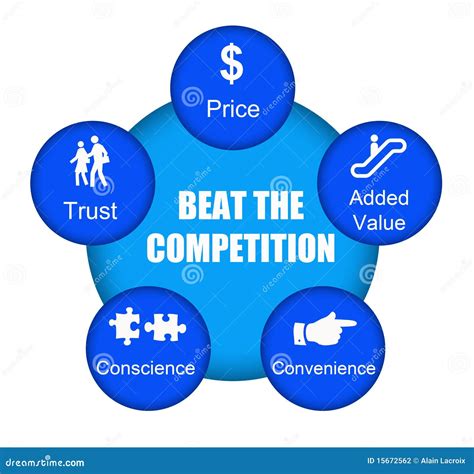Beat the Competition: Your Advantage in the Security Industry
The security industry is a dynamic and ever-evolving landscape. Staying ahead of the curve requires more than just offering standard services; it demands a strategic approach that leverages your unique strengths and anticipates emerging trends. This article explores key strategies to help your security business not only survive but thrive in this competitive market.
Understanding the Competitive Landscape
Before diving into strategies, it's crucial to understand the current competitive landscape. Are you facing large national firms, smaller local businesses, or a mix of both? What are their strengths and weaknesses? Identifying your direct and indirect competitors, analyzing their offerings, and understanding their target market is the first step to developing a winning strategy. Consider factors like pricing, service offerings, technological advancements, and customer service. A thorough competitive analysis provides valuable insights into potential opportunities and areas for differentiation.
What Makes Your Security Business Unique? Identifying Your Competitive Advantage
This is perhaps the most crucial aspect. What separates you from the competition? Is it:
- Specialized Expertise: Do you specialize in a niche area like cybersecurity, executive protection, or a specific type of surveillance technology?
- Superior Technology: Are you leveraging cutting-edge technology, such as AI-powered surveillance systems or innovative access control solutions?
- Exceptional Customer Service: Do you provide unparalleled customer support and build strong relationships with clients?
- Competitive Pricing: Are you offering highly competitive pricing while maintaining quality service?
- Strong Local Presence: Do you have a strong reputation and established network within your community?
Defining your unique selling proposition (USP) and communicating it effectively to your target audience is key to attracting and retaining clients.
Leveraging Technology for a Competitive Edge
The security industry is rapidly embracing technological advancements. Integrating the latest technologies can significantly improve efficiency, enhance security measures, and offer clients more sophisticated solutions. Consider investing in:
- Cloud-based Security Systems: These systems offer scalability, remote accessibility, and cost-effectiveness.
- AI-powered Surveillance: AI can analyze video footage, detect anomalies, and improve the accuracy of threat detection.
- Biometric Access Control: Biometric systems offer a more secure and convenient alternative to traditional access control methods.
- Cybersecurity Solutions: With the increasing threat of cyberattacks, offering robust cybersecurity services is becoming increasingly important.
Investing in Employee Training and Development
Your employees are your greatest asset. Investing in their training and development is crucial for maintaining a high level of service and staying ahead of the competition. Focus on:
- Technical Skills: Ensure your employees are proficient in using the latest security technologies.
- Customer Service Skills: Train your employees to provide exceptional customer service and build strong relationships with clients.
- Professional Development: Encourage your employees to pursue professional certifications and stay up-to-date on industry trends.
Building Strong Client Relationships
Building and maintaining strong client relationships is critical for long-term success. Focus on:
- Proactive Communication: Keep your clients informed about potential threats and security updates.
- Personalized Service: Provide tailored security solutions that meet the specific needs of each client.
- Regular Follow-up: Check in with your clients regularly to ensure their satisfaction and address any concerns.
Marketing and Branding Strategies
Effective marketing and branding are essential for attracting new clients and building brand awareness. Consider:
- Online Presence: Develop a professional website and maintain an active presence on social media.
- Content Marketing: Create valuable content, such as blog posts, articles, and videos, to establish your expertise and attract potential clients.
- Networking: Attend industry events and network with other professionals to build relationships and generate leads.
Adapting to Changing Trends
The security industry is constantly evolving. To stay ahead of the competition, it’s essential to adapt to changing trends and emerging threats. Stay informed about new technologies, security vulnerabilities, and industry best practices.
How Can I Stay Ahead of the Competition in the Security Industry?
This question encapsulates the core of this article. The answer lies in a multi-faceted approach combining technological advancements, employee development, strong client relationships, and proactive marketing. Continuously evaluate your services, adapt to market demands, and invest in innovation to ensure your security business remains competitive and successful.
What are the Biggest Challenges Facing Security Companies Today?
Security companies face numerous challenges, including the increasing sophistication of cyber threats, the need to adopt new technologies rapidly, fierce competition, and the constant need to upskill employees to meet these challenges. Maintaining a competitive edge requires constant vigilance and adaptability.
What are the Future Trends in the Security Industry?
Future trends in the security industry point towards increased automation, AI-driven solutions, cybersecurity specialization, and a greater emphasis on data analytics and predictive capabilities. Businesses that embrace these advancements will be well-positioned for future success.
By implementing these strategies, your security business can effectively beat the competition and establish itself as a leader in the industry. Remember that consistent effort, adaptation, and a commitment to excellence are key to long-term success.

